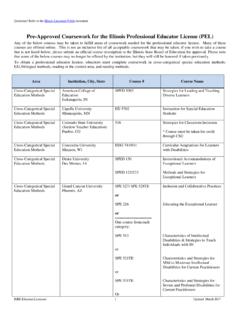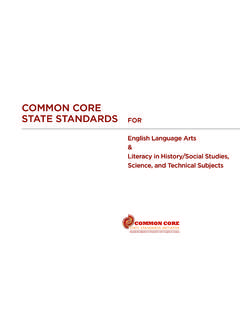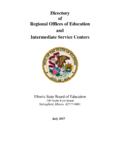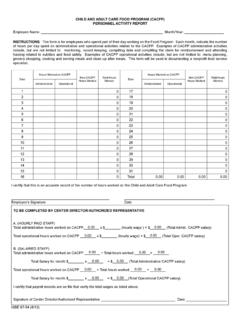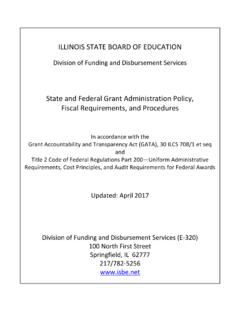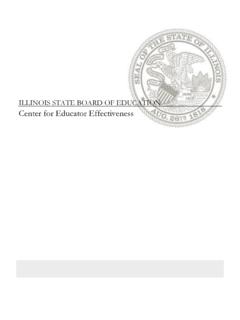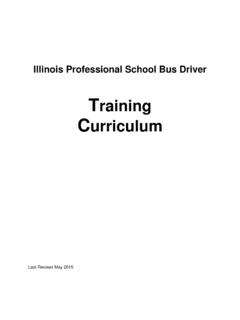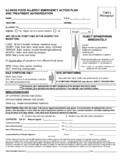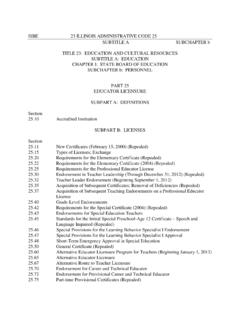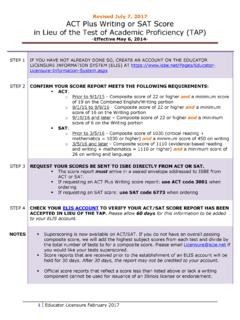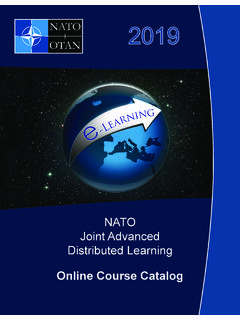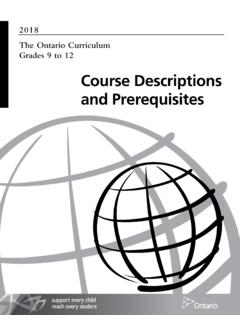Transcription of State Course Catalog - Illinois State Board of Education
1 Illinois State Board of Education State Course Catalog Illinois State Board of Education 100 North First Street Springfield, IL 62777-0001. July 2021. Contents Foreword .. iii Introduction .. iii ISCC Course Listing .. 1. 01 English Language and Literature .. 1. 02 Mathematics .. 19. 03 Life and Physical Sciences .. 37. 04 Social Sciences and History .. 56. 05 Fine and Performing Arts .. 78. 07 Religious Education and Theology .. 111. 08 Physical, Health, and Safety Education .. 117. 09 Military Science .. 133. 10 information Technology .. 142. 11 Communication and Audio/Visual Technology .. 165. 12 Business and Marketing .. 180. 13 Manufacturing .. 202. 14 Health Care Sciences .. 214. 15 Public, Protective, and Government Service .. 238. 16 Hospitality and Tourism .. 250. 17 Architecture and 261. 18 Agriculture, Food, and Natural Resources.
2 277. 19 Human Services .. 310. 20 Transportation, Distribution and Logistics .. 334. 21 Engineering and Technology .. 349. 22 Miscellaneous .. 368. 23 Non-Subject-Specific .. 378. 24 World Languages .. 382. ii Foreword The Illinois State Course Catalog (ISCC) outlines a coding system and Course descriptions for Education throughout the State . The Catalog is intended to help schools and Education agencies collect and maintain longitudinal information about students'. coursework in an efficient, standardized format that facilitates the exchange of records as students transfer from one school to another, or to postsecondary Education . Illinois developed the ISCC based upon the work of the School Codes for the Exchange of Data (SCED) developed by the National Center for Education Statistics (NCES). The work of Illinois schools with the ISCC provides for the routine collection of information to help the Education system function efficiently and effectively.
3 Standardized data available to Education agency officials can: assist in the development of sound educational policies at all levels;. improve the quality of instruction and boost student achievement;. help compare information among communities and among states ;. improve the accuracy and timeliness of nationwide summaries of information about Education systems;. improve the quality and significance of Education research locally, statewide, and nationwide; and enhance reporting to the public about the condition and progress of Education . The Illinois State Board of Education (ISBE) acknowledges the significant contributions of the SCED in its development of the Illinois State Course Catalog . Introduction Developing a System for Classifying Courses In the summer of 2003, the National Center for Education Statistics (NCES) initiated work to develop a common classification system for school courses in the United states .
4 The resulting School Codes for Exchange of Data (SCED) is the foundation work for the Illinois State Course Catalog (ISCC). The primary purpose of the ISCC system is to make it easier for school districts and states to maintain longitudinal student records electronically, and to transmit Course taking information from one student information system to another, from one school district to another, and from a school district to ISBE. As substantial numbers of states and entities adopt coding systems, it will produce a secondary benefit: standardized Course information for those who evaluate transcripts for postsecondary admission or research purposes. iii More specifically, a common classification system for secondary school courses would achieve the following: enable comparison of Course offerings among districts and states ;. facilitate the use of electronic student transcripts.
5 Support longitudinal student information systems;. encourage interoperability of student information and other data management systems by providing a standard for Education software designers and vendors;. reduce the cost and burden of transcript studies; and encourage the use of Course taking information in research and evaluation of student outcomes. Illinois Longitudinal Data System The Illinois Longitudinal Data System, including The Transcript Coding Project, is also designed to meet the following needs: implement all of the America COMPETES Act elements;. support a broad array of State and LEA Education functions; and, collect PK-20 individual student data. The Illinois State Course Catalog (ISCC). The ISCC has been developed between in response to the requirements of Illinois legislative action and the Illinois Longitudinal Data System.
6 It provides a listing of over 1,400 Illinois school Course codes. Use and Users of the Course Catalog Classification System Uses within the Education system - A common Course classification system assists states developing statewide longitudinal data systems to meet the reporting requirements of local and State mandates, as well as to support Federal requirements. Without a statewide Course classification system, it can be very burdensome to collect and interpret information from school districts about student Course taking and the qualifications of teachers responsible for those courses. The Course classification system can be of benefit when a student transfers from one district to another. A major objective of the ISCC is to provide common Course descriptions that enable school counselors to compare courses more easily when reviewing the transcript of a transferring student.
7 A common system for describing courses saves the counselor's time and ensures that the student is placed in appropriate classes without delay. iv Postsecondary institutions need information about students and their coursework, typically to determine students' eligibility for enrollment, financial assistance, and eventual placement. For example, the National Collegiate Athletic Association (NCAA). uses secondary Course information to determine a student's eligibility for postsecondary athletic programs. A completed Longitudinal Data System, with appropriate privacy law safeguards built into it, can provide common transcript information to help postsecondary institutions and organizations fairly evaluate the Course taking patterns of any high school student. Involvement of the Education software community - Interoperability in data management systems means that information can be transferred from one system to others with no effort on the part of a user.
8 In a school district, for example, interoperable software applications would ensure that when the name and address of a new student are entered into the system once, the information also appears in the district's library, class assignment, transportation, food service, student information management, and other relevant systems. ISCC provides a standard Course coding framework for vendors of school information systems who are working toward interoperability. As vendors become aware of the ISCC, the Course coding structure and definitions can be included in student information systems or used to form a common crosswalk from one system to another. Facilitating the research use of transcript data - Researchers and policymakers represent another important use of Course -related information . Education researchers typically want to identify trends in Course taking and in students' access to educational experiences, examine links between practice and desired outcomes, and analyze differences between subsets of students.
9 Data about courses are combined with information about the students and their teachers, schools, parents, and communities in a number of ways. Illinois , like many other states , is developing a longitudinal student data system in order to measure the added value of Education to students as they move through the Education pipeline. information about the courses that students take, and their performance in these courses, is vital to understanding the effects of Education but almost impossible to measure without a standard system for describing courses. The ISCC provides comparability for that effort and can greatly reduce the time it takes to review Course information . v ISCC Course Listing 01 English Language and Literature 01 English Language And Literature 1. 01054A000 American Literature American Literature courses focus upon commonly known American authors and their work.
10 Students improve their critical-thinking skills as they determine the underlying assumptions and values within the selected works and as they understand how the literature reflects the society of the time. Oral discussion is an integral part of literature courses, and written compositions are often required. (Available SY 2011-.). 01055A000 American Literature/History American Literature/History courses integrate the study of American literature with an overview of history. These courses may also include other aspects of American culture, such as art or music. A two-year sequence or two-period per day class may be required to cover the same objectives as would be covered separately in History Overview and American Literature. (Available SY 2011-.). AP Course 01005A000 AP English Language and Composition Following the College Board 's suggested curriculum designed to parallel college-level English courses, AP.
